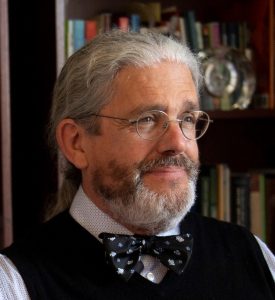
Great Smoky Mountains Association has announced Western Carolina University professor Dr. Brian Railsback as the recipient of its 2023 Steve Kemp Writer’s Residency. The annual residency, funded by GSMA, is designed to help writers of any medium connect in meaningful ways with Great Smoky Mountains National Park, providing space for each individual to focus on his or her craft in a retreat-like setting while potentially inspiring some of their best work.

A professor of English at Western Carolina University, Railsback examines the intersections of literature and environment in his scholarly work. He has published numerous articles, essays, and book chapters, including the nonfiction Parallel Expeditions: Charles Darwin and the Art of John Steinbeck and the novel The Darkest Clearing. In 2006, he won the Hemingway-inspired Prose for Papa Short Story Award, and in 2015, he was elected to the editorial board of The Steinbeck Review, a publication on the life and works of John Steinbeck.
As part of the residency, Railsback will live in the park for a total of six weeks while also working with program namesake Steve Kemp and GSMA Creative Director Frances Figart, who oversees the program, as well as other park professionals and partners. During the residency, Railsback plans to finish a novel about a man who has turned into a black bear and his wife who sets out to track and kill the beast who she believes has killed her husband.
“I can think of nothing better than to be immersed in the park as I fine-tune the book’s vision,” said Railsback. “Because the novel is at heart a fantasy, it must be carefully grounded in the realities of regional flora and fauna and certainly observed black bear behavior.”
The program is named for 30-year GSMA veteran Steve Kemp, who retired in September 2017 after directing the publication of hundreds of books, magazines, brochures, newsletters, and other interpretive materials that continue to support the preservation of Great Smoky Mountains National Park.
“We had some really strong candidates for this year’s residency, but the selection committee agreed that Brian’s blend of fiction with natural history is in a category all its own,” said Figart. “He is already so attuned to lessons only the natural world can teach; we cannot wait to see what he is going to do with the park’s inspiration.”
At WCU, Railsback teaches a course called Literature and the Environment that often imparts lessons about the natural world through literary storytelling. Watching his students learn in this way reminded the professor of a statement once made by Steve Kemp: “I accept the fact that my audience may be more interested in the pool at their motel or sitting in a rocking chair at their chalet than hearing about biological zones in the mountains.”
Kemp’s words resonate with Railsback both in and out of the classroom. “My scholarly essays might create a footnote or two, but stories reach people,” he said. “I don’t propose to write a novel about climate change, but rather tell a story that might set a reader to wondering, What would it be like if I was turned into a bear and stepped out of humanity’s circle for a while? I hope this novel will do what Mr. Kemp suggests: for a moment, knock people out of themselves and consider the precious, wide natural world around them.”
For more information on the Steve Kemp Residency, visit smokiesinformation.org/the-steve-kemp-writers-residency/.
Subscribe to get the latest posts sent to your email.
The Great Smokies Welcome Center is located on U.S. 321 in Townsend, TN, 2 miles from the west entrance to Great Smoky Mountains National Park. Visitors can get information about things to see and do in and around the national park and shop from a wide selection of books, gifts, and other Smokies merchandise. Daily, weekly, and annual parking tags for the national park are also available.